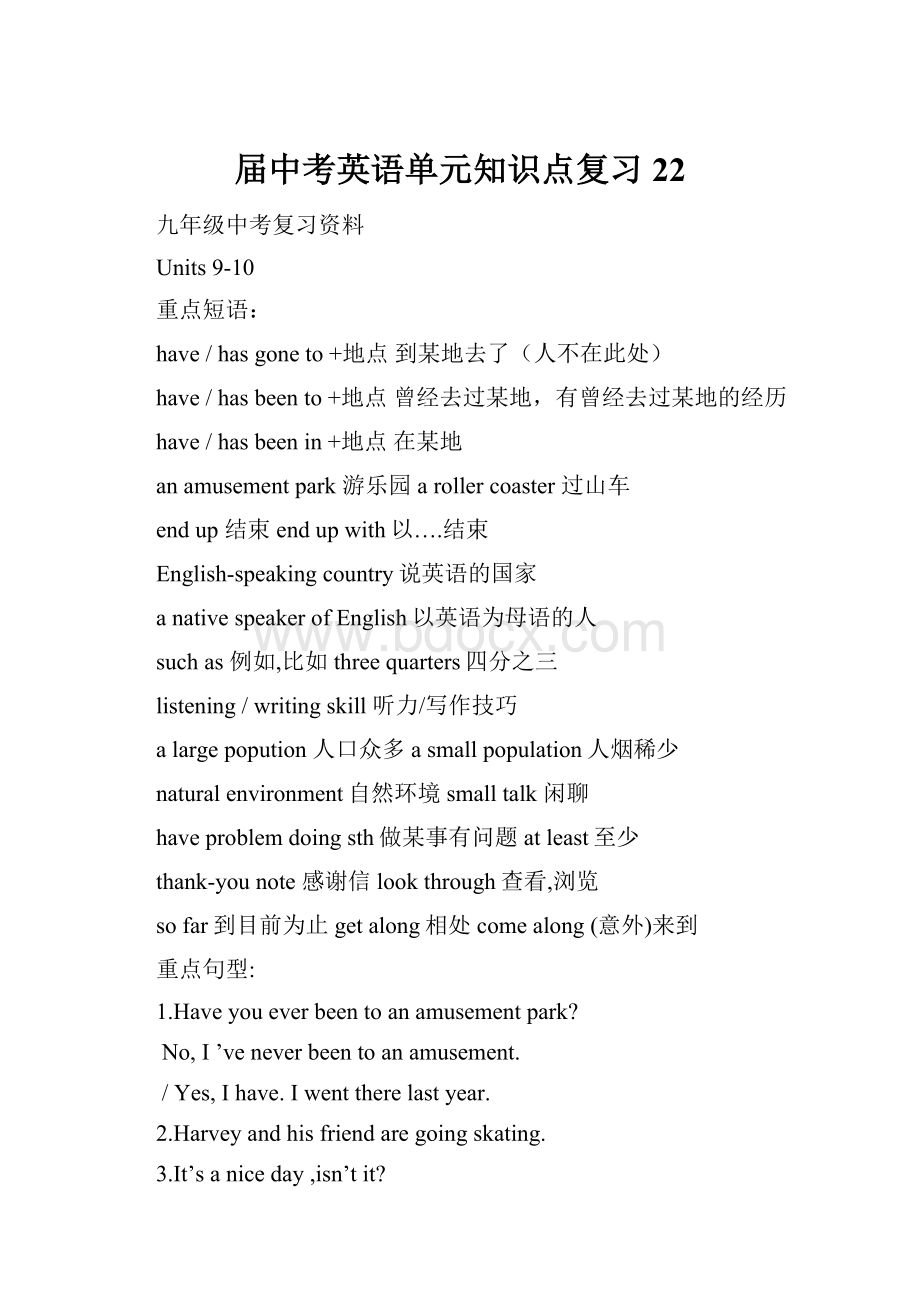届中考英语单元知识点复习22.docx
《届中考英语单元知识点复习22.docx》由会员分享,可在线阅读,更多相关《届中考英语单元知识点复习22.docx(10页珍藏版)》请在冰豆网上搜索。

届中考英语单元知识点复习22
九年级中考复习资料
Units9-10
重点短语:
have/hasgoneto+地点到某地去了(人不在此处)
have/hasbeento+地点曾经去过某地,有曾经去过某地的经历
have/hasbeenin+地点在某地
anamusementpark游乐园arollercoaster过山车
endup结束endupwith以….结束
English-speakingcountry说英语的国家
anativespeakerofEnglish以英语为母语的人
suchas例如,比如threequarters四分之三
listening/writingskill听力/写作技巧
alargepopution人口众多asmallpopulation人烟稀少
naturalenvironment自然环境smalltalk闲聊
haveproblemdoingsth做某事有问题atleast至少
thank-younote感谢信lookthrough查看,浏览
sofar到目前为止getalong相处comealong(意外)来到
重点句型:
1.Haveyoueverbeentoanamusementpark?
No,I’veneverbeentoanamusement.
/Yes,Ihave.Iwenttherelastyear.
2.Harveyandhisfriendaregoingskating.
3.It’saniceday,isn’tit?
Yes,itis.Ireallylovehotweather.
4.You’reJenny’sfriend,aren’tyou?
Yes,Iam.
清单一:
动词的-ing形式及语法功能
1.动词的-ing形式
动词-ing形式是英语中较多的形式之一,它是动词原形+ing构成的。
它既具有动词的一些特征,又具有名词的一些特征.在句中可作主语、宾语、宾语补足语、表语、定语、状语。
它没有人称和数的变化,但有时态和语态的变化。
否定式:
not+动词的-ing形式
2.动词的-ing形式的语法功能:
①作主语,往往说明事物的普遍性、广泛性:
Readingaloudisveryhelpful.大声朗读是很有好处的。
Collectingstampsisinteresting.集邮很有趣。
当动词的-ing形式短语作主语时常用it作形式主语。
It’snousequarrelling.争吵是没用的。
用法点津:
不定式和动词的-ing形式作主语的区别。
不定式更强调具体性,往往有明确的时间,而动词的-ing形式是一种泛指.一种体验,不是明确的发生在过去.现在或将来的动作,更具有普遍性。
Readingisreallyfun.读书真有趣。
Toreadsuchastoryishard.读这样一个故事真是难。
②作表语,用以说明事物的身份.性质等,此时和不定式的用法相同:
Whathelikesisplayingfootballafterclass。
他所喜欢的事就是课后踢足球。
③作宾语:
Doyouenjoylisteningtopopmusic?
你喜欢听流行音乐吗?
Wearethinkingofmakinganewplan.我们正考虑制定一个新计划。
Iamnowbusysendingpostcards.我现在正忙于邮寄贺年卡。
注意动词的-ing形式既可以作动词宾语也作介词和形容词的宾语,如上面三个例句。
此外,动词的-ing形式作宾语是时,若跟有宾语补足语,则常用形式宾语it,如;
Wefounditnogoodmakingfunofothers。
我们发现取笑他人不好。
用法点津:
如下动词及短语只跟动词-ing形式作宾语:
enjoy、finish、suggest、avoid(避免)、excuse、delay、imagine、keep、miss、consider、admit(承认)、deny(否认)、mind、permit、forbid、pratise、risk、appreciate、bebusy、beworth、feellike、can’tstand、can’thelp、thinkof、dreamof、befondof、prevent(from)、keep…from、stop…from、protect…from、setabout、beengagedin、spend…(in)、succesdin、beusedto、lookforwardto、objectto、payattentionto、insideon、feellike.
④作定语,表示被修饰词的性质、身份、用途、正在进行的行为或状态等:
Theoldmanhastowalkwithawalkingstick.
这个老人只好借助拐杖走。
Thisisaninterestingstory.这是一个有趣的故事。
Themanwaitingatthegateisaskingtoseeyou.
在大门口等的那个人要见你。
⑤作宾语补足语,表明宾语的性质、状态或正在进行的行为:
如下动词后可跟动词的-ing形式作宾语补足语:
see,watch,hear,feel,found,get,keep,notice,observe,listento,
lookat,leave,catch,discover等。
Canyouhearhersinginginthenextroom.你能听见她在隔壁唱歌吗?
Hekeptthecarwaitingatthegate.他让小汽车在门口等着。
⑥作状语,表示时间、原因、伴随、条件、结果、目的等:
(While)Wokinginthefactory,hewasanadvancedworker。
在工厂工作时,他是一名先进工人(表示时间)。
BeingaLeaguemember,heisalwayshelpingothers。
由于是共青团员,他经常帮助别人。
(表示原因)
Hestayedathome,cleaningandwashing。
他呆在家里,又擦又洗。
(表伴随)
(If)playingallday,youwillwasteyourvaluabletime.
要是整天玩,你就会浪费宝贵的时间。
(表条件)
Hedroppedtheglass,breakingitintopieces.
他把杯子掉了,结果摔得粉碎。
(表结果)
Hewentswimmingtheotherday.几天前他去讲话了。
(目的)
⑦做让步状语:
Thoughrainingheavily,itclearedupverysoon.
虽然雨下得很大,但不久天就晴了。
清单二:
不定式与动词-ing形式宾语的比较
1.在下列一些动词后面常跟动词-ing作宾语,而不跟不定式:
admit,appreciate,advice,allow,consider,delay,dislike,enjoy,escape,excuse,face,feellike,finish,fancy,forbid,imagine,include,keep,metion,mind,miss,practice,resist,risk,suggest等。
如:
HepracticesspeakingEnglisheveryday.
他每天练习说英语。
Headmittedhavingbrokenthewindow.
他承认打破了那扇窗子。
Imuchappreciateyourgivingmethechance.
我非常感激你给了我这个机会。
2.在下列一些动词后只跟不定式,不跟动词-ing做宾语:
want(想要),hope,expect(期望),wish,decide,wouldlike,refuse,manage,pretend,demand,offer,afford,plan,wonder,intend……等。
如:
Iamexpectingtogetaletterfrommyparents.
我期待着父母的来信。
Weareplanningtobuildanotherresearchcenter.
我们正计划着建另一所研究中心。
3.在下列一些动词后面跟不定式或动词-ing形式作宾语,意义不同。
如:
(1)Irememberdoingthisexercisdebefore.我记得前做过这个练习。
Remembertopostthebookforme.记住帮我把那本书寄走。
辨析:
rememberdoing记得做过某事(某事已做过)
remembertodo记住去做某事(某事还没做)
(2)WeshallneverforgethearingJacksonsinging.
我们忘不了听杰克逊唱歌的情形。
Don’tfogettogivemyregardstothem.
别忘了代我向他们问好。
辨析:
forgetdoing忘了做过的事(某事已做过)
forgettodo忘了去做某事(某事还没做)
(3)I’lltrytoimprovemypronunciation.
我会试着改善我的发音。
Sincenooneansweredthefrontdoor,whynottryknockingatthebackdoor?
既然前门没人答应,为什么不试试后门呢?
辨析:
trytodo尽力去做某事
trydoing(用另外一种方式)试一试,试试看
(4)Isuggestwestopworkingandhavingarese.
我们停下来休息一会儿。
Theystoppedtolisten,buttherewasnomoresound.
他们停下来,听一听,再没什么声音。
辨析:
stoptodo停下(某事)去做(另一件)事。
(表目的)
stopdoing把(正在做的)某事停下来。
(宾语)
(5)Whatdoyoumeantodowithyouroldbicycle?
打算如何处理你那辆旧自行车?
Iwon’twaitifitmeansdelayingaweekorso.
如果这意味着要推迟一个星期左右,那我就不等了。
辨析:
meantodo打算做某事
meandoing意味着做某事
4.在love,like,hate,prefer后面跟不定式和动词-ing形式无多大区别,如:
Doyouliketoeatanice-cream?
你想吃冰淇淋吗?
Iliketravelingverymuch.我非常喜欢旅游。
5.在start,begin后面,一般接不定式和动词-ing形式无多大区别,在下列情况下,一般用不定式:
①自然界变化:
Itstartedtorain.开始下雨了。
Sonwstartedtomeltasspringcame.春天来了,雪开始融了。
②心理活动,在understand,know,reaside等词前面:
Ibegantounderstandmymother’sfeelings.
我开始理解母亲的感受了。
③begin,start本身为现在进行时:
MotherwasstartingtocookinthekitchenwhenIgothome.
我到家时母亲在厨房开始做饭。
6.在allow,advise,permit,forbid等词后面,有名词或代词作宾语,用不定式作宾语补足语,如果没有宾语,直接用ing形式,如:
Wedon’tallowparkinghere.我们不允许在这儿停车。
Thepolicedon’tallowpeopletoparkhere.警察不允许在这儿停车。
7.need,require,want译作“需要”时,跟动词ing形式作宾语,主动表示被动,相当于tobedone,如:
Thewindowsrequirecleaning.
Thewindowsrequiretobecleaned.窗子要擦了。
8.在一些固定表达中用ing形式,不用不定式:
can’thelpdoing,beworthdoing,devote…todoing,lookforwardtodoing,be/get/becomeusedtodoing,objecttodoing,thank…fordoing,excuse…fordoing等。
Einsteindevotedhislifetomakingaresearchinscience.
爱因斯坦终身致力于科学研究。
I’mlookingforwardtogettingyourletter.我期盼收到你的来信。
清单三:
动词-ing形式与-ed形式作形容词时的区别
动词-ing形式在句中作定语,表示一个正在进行的动作,它与主语中心词之间存在着主谓关系。
动词的-ed形式在句中作定语,表示一个已完成的或被动的动作,它与中心词之间存在着动宾关系。
如:
Thiswasbecausetherewasnomachineallowingapersontobreatheunderwaterforalongtime.这是因为没有一台可以让人在水下长时间呼吸的机器。
WeliveinaplacecalledGumTree.
我们住在一个叫做桉树村的地方。
Takeawaythebrokenglass.把那个被打碎的玻璃杯拿走。
Thesleepingbabyishers.那个睡着的孩子是她的。
走进中考
动词的-ing形式做主语
1.—DidyouhaveanyproblemsinLondon?
—Yes,______Chinesefoodlikerice,noodlesanddumplings.
A.findB.foundC.findingD.tofind
2.—What’smadeyousoupset?
—_____threeticketstothepopmusicconcert.
A.LostB.LosingC.BecauseoflosingD.SinceIlost
动词-ing的形式作宾语
3.Samenjoys_______stamps.Andnowhehas266ofthem.
A.tocollectB.collectedC.collectsD.collecting
4.We’relookingforwardto______theWorldCup2018inGermany.
A.visitingB.watchingC.looking
5.Wouldyoumind______moreslowly?
Ican’tfellowyou.
A.speakB.spokeC.spokenD.speaking
只能跟-ing形式的动词或短语
6.“Wouldyoumind_____themusic?
”“No,notatall.”
A.turnonB.toturnoverC.turningon
7.—Areyouafraidof_____athome,Linda?
—No,I’vegrownup.
A.aloneB.beingaloneC.lonelyD.beinglonely
8.WhenI_____thefarm,thechildrenhavefinished_____theapple.
A.reach;pickingB.got;picking
C.came;pickedD.arrivedin;topick
既能跟-ing形式又能跟不定式作宾语的动词
9.—Where’sMrYu,doyouknow?
—Well,it’shardtosay.ButIsawhim_____.
A.waswatchingB.watchingC.hadwatchedD.watched
10.Sheoughttostop______,shehasaheadachebecauseshe______toolong.
A.towork,wasreadingB.towork,hasread
C.working,hasreadD.working,read
11.Janelikessinging,weoftenhearher______afterclass.
A.singB.tosingC.singsD.sang
动词-ing形式与-ed形式作形容词时的区别
12.—What____newsitwas!
—Yes,allofthechildrenwere_____.
A.excited;excitingB.exciting;excited
C.exciting;excitingD.excited;excited
13.Thedoctor_____a______boyyesterday.
A.hadsaved,dyingB.saved,dead
C.hassaved,deadD.saved,dying
中考热身
1.Listen!
Canyouhearthebaby_____?
A.cryB.tocryC.cryingD.cries
2.—Doyoulikesports?
—Sure,Iamlookingforwardto______the28tholympicgames______inGreecethisAugustonTV.
A.watch;tobeheldB.watching;beingheld
C.watching;tobeheldD.watch;held
3.Heaskedmetogiveupworkingonthismathsproblem.It’stoodifficult.Here“giveupworking”means______.
A.goonworkingB.stopworkingC.stoptpworkD.workout
4.Theboy_____intheteacher’sofficewasfound______yesterday.
A.standing;smokeB.syanding;smorking
C.stood;smokeD.stood;smoking
5.—Doyoustillremenber_______mesomewhereinshanghai?
—Yes,ofcourse.Twoyearsago.
A.toseeB.seeC.seeingD.saw
7.Wouldyoumind_____mehow______Englishwords?
A.tell;torememberB.telling;remember
C.telling;torememberD.tell;remember
8.—IsJimathomebyhimself?
—No.there’sanotherboy_____withhim.
A.playingB.playC.playsD.toplay
9.—Haveyoufinishedthework?
—Notyet,
butnomatterhowharditis,we’llkeep____untilwemakeit.
A.failedB.tryingC.triedD.failing
10.—Doyouwanttoeatsomething?
—_____,thanks.Iamfeelingsicknow.Idon’tfeellike_____.
A.Yes;eatingsomethingB.No;toeatanything
C.Yes,toeatanythingD.No;eatingsomething